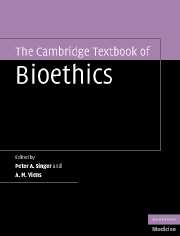Book contents
- Frontmatter
- Contents
- List of contributors
- Acknowledgements
- 1 Introduction
- Section I Information problems
- Section II End of life care
- Section III Pregnant women and children
- Section IV Genetics and biotechnology
- Section V Research ethics
- Section VI Health systems and institutions
- Section VII Using clinical ethics to make an impact in healthcare
- Section VIII Global health ethics
- Section IX Religious and cultural perspectives in bioethics
- Introduction
- 47 Aboriginal bioethics
- 48 Buddhist bioethics
- 49 Chinese bioethics
- 50 Hindu and Sikh bioethics
- 51 Islamic bioethics
- 52 Jehovah's Witness bioethics
- 53 Jewish bioethics
- 54 Protestant bioethics
- 55 Roman Catholic bioethics
- Section X Specialty bioethics
- Index
- References
49 - Chinese bioethics
Published online by Cambridge University Press: 30 October 2009
- Frontmatter
- Contents
- List of contributors
- Acknowledgements
- 1 Introduction
- Section I Information problems
- Section II End of life care
- Section III Pregnant women and children
- Section IV Genetics and biotechnology
- Section V Research ethics
- Section VI Health systems and institutions
- Section VII Using clinical ethics to make an impact in healthcare
- Section VIII Global health ethics
- Section IX Religious and cultural perspectives in bioethics
- Introduction
- 47 Aboriginal bioethics
- 48 Buddhist bioethics
- 49 Chinese bioethics
- 50 Hindu and Sikh bioethics
- 51 Islamic bioethics
- 52 Jehovah's Witness bioethics
- 53 Jewish bioethics
- 54 Protestant bioethics
- 55 Roman Catholic bioethics
- Section X Specialty bioethics
- Index
- References
Summary
Mr. D is a 75-year-old Chinese Canadian who has been admitted to the intensive care unit because of respiratory failure. He has a long history of respiratory problems. Mechanical ventilation is started. Mr. D is oriented to time, person, and place. He spends much of his time reading and enjoys his family's visits. Attempts to wean him from the ventilator have failed; consequently, he is facing a situation of permanent dependence on the breathing machine. It is unclear as to what Mr. D's wishes related to this would be. The physician in charge wishes to inform Mr. D that he is unable to get him to a point where he can be taken off the ventilator and wants to introduce the option of gradually weaning him off the ventilator and keeping him comfortable so that nature may take its course and he may die in peace. The patient's eldest son is described to the healthcare team as “the decision maker.” He approaches the physician and asks emphatically that his father not be told that he is permanently dependent on the ventilator as it would take away his hope, terrify him and, in turn, make him sicker. The son feels that telling his father would be cruel and is, therefore, unjustifiable.
What is Chinese bioethics?
Bioethics as a discipline does not formally exist within traditional Chinese culture. For many Chinese who have grown up or spent much of their lives in a culture characterized by strong communal values and an emphasis on social harmony, the process of explicit bioethical deliberation will be unfamiliar.
- Type
- Chapter
- Information
- The Cambridge Textbook of Bioethics , pp. 397 - 402Publisher: Cambridge University PressPrint publication year: 2008



